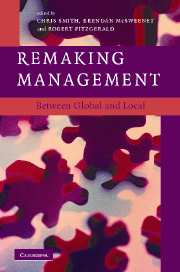Book contents
- Frontmatter
- Contents
- List of tables
- Notes on contributors
- 1 Remaking management: neither global nor national
- Part I Conceptualising International and Comparative Management
- Part II Systems in Transition
- Part III Society as Open and Closed
- Preface: Society and comparative differences
- 8 Capitalism and Islam: Arab business groups and capital flows in south-east Asia
- 9 Challenges to the German theatrical employment system: how long-established institutions respond to globalisation forces
- 10 Between the global and the national: the industrial district concept in historical and comparative context
- 11 Transnational learning and knowledge transfer: a comparative analysis of Japanese and US MNCs' overseas R&D laboratories
- Part IV The Search for Global Standards
- Index
8 - Capitalism and Islam: Arab business groups and capital flows in south-east Asia
Published online by Cambridge University Press: 06 July 2010
- Frontmatter
- Contents
- List of tables
- Notes on contributors
- 1 Remaking management: neither global nor national
- Part I Conceptualising International and Comparative Management
- Part II Systems in Transition
- Part III Society as Open and Closed
- Preface: Society and comparative differences
- 8 Capitalism and Islam: Arab business groups and capital flows in south-east Asia
- 9 Challenges to the German theatrical employment system: how long-established institutions respond to globalisation forces
- 10 Between the global and the national: the industrial district concept in historical and comparative context
- 11 Transnational learning and knowledge transfer: a comparative analysis of Japanese and US MNCs' overseas R&D laboratories
- Part IV The Search for Global Standards
- Index
Summary
Introduction
This is an historical analysis of Arab capitalism in south-east Asia from the early nineteenth century to the present. It attempts to trace the critical phases of this capitalist evolution, determining its specific role in trade, finance, real estate development, manufacturing and shipping. It poses fundamental questions. How did the Arab groups use diverse regional sites to amass information, disseminate and achieve improved regional economic performance over a long period, from 1830 to the 1960s? Why, therefore, were they dislodged by the late 1960s from these flourishing trading and financial positions in Singapore, Java, Hyderabad and Aden? Did religious identity and institutions create an inability to respond to the dramatic capitalist transformation sweeping south-east Asia after 1960? Were key turning points in capitalist development determined by the technological innovation and markets or by Islamic economics? Here Arab sub-economies, as reproduced in halawa (remittance) shops, Islamic partnerships, contracts, trust and religious morality, and charitable endowments (waqf), are analysed alongside a contiguous relationship with the economic interactions occurring between Muslim business and Chinese, Japanese and European capitalists and state capitalism, and their changing responses and strategies to economic change in the region.
- Type
- Chapter
- Information
- Remaking ManagementBetween Global and Local, pp. 217 - 250Publisher: Cambridge University PressPrint publication year: 2008



